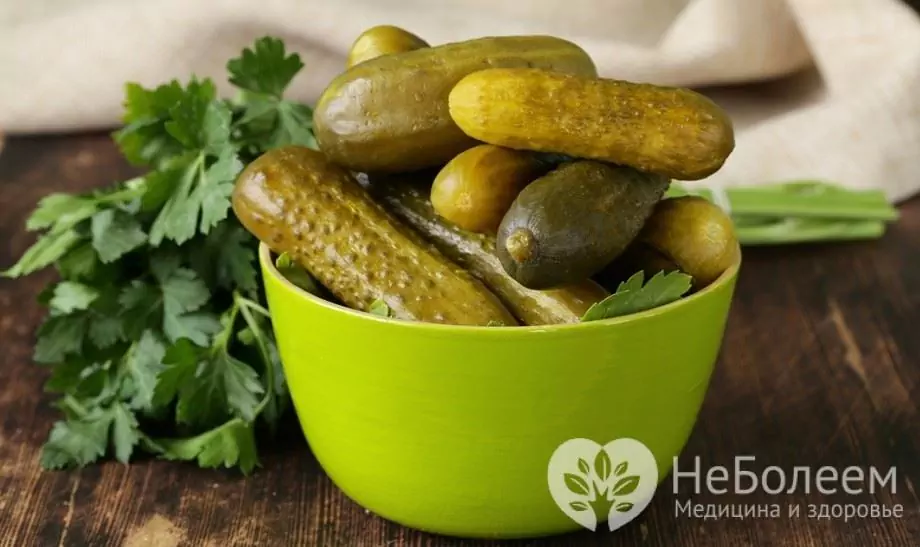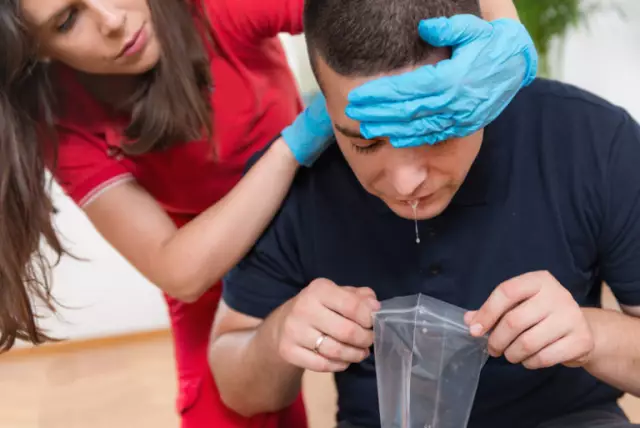- Author Rachel Wainwright wainwright@abchealthonline.com.
- Public 2023-12-15 07:39.
- Last modified 2025-11-02 20:14.
Pickle poisoning
Pickled cucumbers are a favorite delicacy of many people, few people will refuse crispy and juicy cucumber with fried potatoes or stews. However, it is unlikely that many people think that pickle poisoning is not such a rare occurrence.

Source: depositphotos.com
How does pickle poisoning happen?
The main causes of pickle poisoning are:
- bacterial microflora that causes the development of gastroenterocolitis (Escherichia coli, Proteus, Salmonella, Staphylococcus and Streptococcus, Shigella);
- a special kind of bacteria that causes botulism;
- nitrates;
- pesticides;
- heavy metal salts.
Nitrates and pesticides are widely used in agriculture, they are approved for use. But when the permissible rate of introduction of these chemicals into the soil is exceeded, they accumulate in the plants growing in it, including cucumbers. All plants grown along major highways are "rich" in heavy metal salts. When such vegetables are eaten, poisoning occurs associated with functional disorders of many organs, not only the gastrointestinal tract.
Poisoning with pickles by the type of gastroenterocolitis is associated with a violation of sanitary and technological requirements during their preparation and storage. Once in the human body, pathogenic microorganisms produce biologically active substances that have a negative effect on tissues, that is, toxins. The body seeks to remove these substances as soon as possible, which manifests itself in the form of vomiting and diarrhea.
The causative agent of botulism is a spore-forming bacterium that turns into a vegetative form and begins its life in an airless environment. In the spore stage, the causative agent of botulism is able to withstand exposure to temperatures up to 100 0 C. Thus, home sterilization of pickled cucumbers cannot serve as a reliable guarantee against disease. Vegetative forms of bacteria produce botulinum toxin in the process of their vital activity, which is one of the most powerful poisons. It affects the nervous system, as a result of which the nerve impulse is not transmitted to the muscles, and they cannot function fully.
Poisoning symptoms
Depending on what exactly caused the pickle poisoning, the clinical picture has its own characteristics.
So, in case of poisoning with pickles containing a large amount of salts of heavy metals (mercury, pigs, cadmium, thallium), the following are observed:
- stomach ache;
- flatulence;
- diarrhea;
- irritation of the mucous membranes.
When poisoning with pickles with a high content of nitrates, the following symptoms occur:
- nausea;
- vomiting;
- stomach ache;
- diarrhea, in which the feces acquire a chocolate hue or contain an admixture of fresh blood;
- cyanosis of the nail bed, mucous membranes and lips.
Food toxicoinfection in case of pickle poisoning is manifested by the following symptoms:
- pain and rumbling in the stomach;
- nausea and / or vomiting;
- diarrhea;
- increased body temperature;
- weakness;
- headaches and muscle pains.
Botulinum toxin poisoning initially proceeds as normal food poisoning. But then visual disturbances appear very quickly (double vision, "veil" before the eyes) and muscle weakness increases, which is associated with damage to the nervous system. Muscle weakness becomes so strong that patients cannot even hold their head on their own, and are forced to help themselves with this with their hands. As the disease progresses, the respiratory muscles are also affected, which is manifested by shallow breathing and an increase in signs of respiratory failure, up to complete cessation of breathing.

Source: depositphotos.com
First aid for poisoning
Regardless of what exactly caused the development of food poisoning with pickles, first aid will be the same. All measures taken should be aimed at removing toxins from the body.
First of all, the patient should wash the stomach using the simplest "restaurant" method. To do this, they give him a few glasses of salted water to drink and induce vomiting by irritating the root of the tongue. It is advisable to repeat the gastric lavage until the lavage water comes out clean, without food residues.
Then they neutralize toxins and pathogenic bacteria that have already penetrated from the stomach into the small intestine. To do this, you need to take any medicinal product with a sorption effect, for example Polysorb, Activated carbon or Smectu.
In order to remove from the body toxins that have already been absorbed, causing general intoxication, and also to prevent dehydration, the patient should drink a lot of liquids (tea, mineral water without gas, Regidron). You should not immediately drink a large volume of liquid so as not to provoke an attack of vomiting, it is better to drink often and in small portions.
When is medical attention required?
Food poisoning in case of poisoning with cucumbers, provided that first aid is provided correctly, usually disappears within a few days. As a rule, patients do not seek medical help. But there are situations when you can't do it on your own. These include:
- poisoning in debilitated patients;
- symptoms of poisoning are very pronounced or persist for more than two days;
- the appearance of a strong feeling of thirst;
- decreased urine output;
- the appearance of muscle weakness;
- weak shallow breathing;
- cyanosis of the mucous membranes and lips;
- acute abdominal pain.
For all types of poisoning with salty mushrooms, intensive detoxification therapy is carried out, including the appointment of vitamins, intravenous administration of glucose solution and saline solutions.
With food toxicoinfection, antibiotics are indicated after determining the sensitivity of the pathogen. In case of poisoning with salts of heavy metals, specific antidotes are administered, that is, antidotes. Pathogenetic treatment of botulism is carried out with anti-botulinum serum.
Possible consequences
Cucumber poisoning, which proceeds as a common food infection, usually goes away without any negative consequences within a week.
The consequences of botulism and poisoning with salts of heavy metals are much more dangerous. Delay in treatment for botulism can be fatal, and delayed administration of antidote for heavy metal poisoning often causes serious damage to the kidneys, liver, lungs and heart.
Prevention
To reduce the risk of poisoning with pickles, you should follow the rules:
- before pickling, soak cucumbers for several hours in cold water, which should be changed several times - this will reduce the content of nitrates;
- when salting, wash cucumbers and jars thoroughly;
- do not eat pickles from "bombing" cans, as well as those with altered organoleptic characteristics (color, consistency, smell, turbidity);
- store pickles in a cool dry place.
YouTube video related to the article:

Elena Minkina Doctor anesthesiologist-resuscitator About the author
Education: graduated from the Tashkent State Medical Institute, specializing in general medicine in 1991. Repeatedly passed refresher courses.
Work experience: anesthesiologist-resuscitator of the city maternity complex, resuscitator of the hemodialysis department.
The information is generalized and provided for informational purposes only. At the first sign of illness, see your doctor. Self-medication is hazardous to health!






